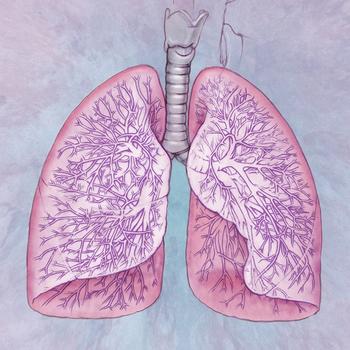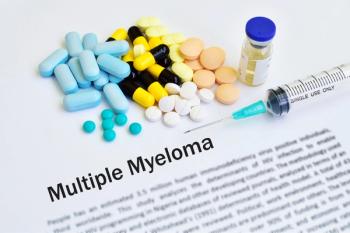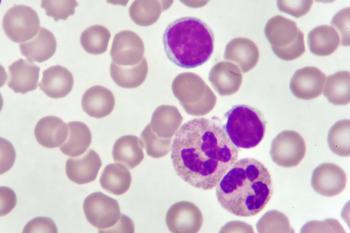
Findings from the monarchE trial presented at ASCO showed that for patients with hormone receptor–positive, HER2-negative, high-risk, early breast cancer, Verzenio provided “consistent treatment benefit.”

Findings from the monarchE trial presented at ASCO showed that for patients with hormone receptor–positive, HER2-negative, high-risk, early breast cancer, Verzenio provided “consistent treatment benefit.”

Treating patients with metastatic castration-resistant prostate cancer with radium-223 also allowed patients to receive subsequent therapies such as chemotherapy.

The CAR-T cell therapy, Tecartus, improved outcomes for patients with B-cell acute lymphoblastic leukemia, offering a promising standard of care for this patient population.

A progression-free survival benefit was observed in patients with advanced ovarian cancer including those with homologous recombination deficient-positive status who were treated with frontline chemo plus Avastin and Imfinzi followed by maintenance therapy with an Avastin regimen.

Three-fourths of patients with relapsed/refractory B-cell acute lymphoblastic leukemia experienced complete responses — which tended to be durable — when treated with the CAR-T cell therapy, Obe-cel.

Results of the Canadian Cancer Trials Group CX.5/SHAPE trial could lead to surgical de-escalation among patients with cervical cancer.

Adding Kisqali to endocrine therapy tended to improve the amount of time patients with HR-positive, HER2-negative early breast cancer lived before their disease became invasive.

The benefit obtained from Keytruda plus chemotherapy in patients with persistent, recurrent or metastatic cervical cancer occurred regardless of whether they also received Avastin.

States that expanded Medicaid had improved survival rates in patients with pancreatic and gastric cancers, with greater improvements in Black patients for some analyses.

A telephone-based weight loss program proved to be efficacious in overweight or obese women with breast cancer and may lead to improved disease outcomes in the long run.

This year, I returned to the American Society of Clinical Oncology meeting, where I heard about the latest advancements in cancer care, as well as met with fellow patients and advocates.

Treatment with Venclexta plus Gazyva, with or without Imbruvica, led to better outcomes than chemoimmunotherapy in patients with chronic lymphocytic leukemia.

Brukinsa, which was approved in September 2021, resulted in better ouctomes for certain patients with with Waldenström macroglobulinemia, according to the ASPEN clinical trial.

Patients who underwent Revlimid, Velcade, and dexamethasone therapy followed by maintenance Revlimid, tended to have better outcomes when they underwent autologous stem cell transplant.

The use of Jakafi plus chemotherapy shows promise in the pre- and post-surgical treatment settings for patients with stage 3 and 4 ovarian cancer, warranting further study of the combination.

Keytruda, an immunotherapy agent, demonstrated significant improvement in both distant metastasis-free survival and recurrence-free survival compared to placebo.

After more than two years of follow-up, patients with previously untreated, locally advanced stage 3 non–small cell lung cancer continue to derive a benefit from treatment with Keytruda and chemoradiation.

One-hundred percent of patients with stage 2/3 mismatch repair-deficient rectal cancer had their disease disappear after treatment with Jermperli, though more research and longer follow-up is needed.

Although ineffective in patients with non-small cell lung cancer and brain metastases at diagnosis, treatment with Exkivity may benefit patients with EGFR exon 20 insertion-positive metastatic disease.

The use of the chemotherapy ifosfamide was associated with small improvements in survival outcomes in a group of patients with relapsed/refractory Ewing sarcoma, a rare type of bone or soft tissue cancer.

The findings of the study show that Enhertu should be a new standard of care for patients with HER2-low metastatic breast cancer, according to an expert at Memorial Sloan Kettering Cancer Center.

Patients with multiple myeloma were more likely to have no traceable amounts of disease left when Darzalex was added to a treatment regimen of Revlimid, Velcade and dexamethasone.

Survival outcomes and side effect rates were similar in patients with extensive-stage small cell lung cancer who did and did not have tiragolumab added to their treatment regimen of Tecentriq and chemotherapy.

Despite similar responses to treatment, patients with previously treated non-small cell lung cancer derived a better overall survival benefit from treatment with Keytruda combined with Cyramza than the usage of standard-of-care therapies.

At a follow-up of more than two years, treatment with a novel drug produced meaningful results in a group of patients with HER3-expressing metastatic breast cancer or metastatic triple-negative breast cancer.

The investigational agent SOT101 was safe and tolerable when given alone and in combination with Keytruda for patients with solid tumors.

Long-term study results show that outcomes, such as survival and response rates, in patients who have received Calquence-containing treatment regimens continue to outpace outcomes in those who were given Gazyva and chemotherapy.

Treatment with Trodelvy resulted in slight survival improvements, when compared with standard of care chemotherapy regimens, in patients with hormone receptor–positive, HER2-negative metastatic breast cancer.

Treatment with Lenvima plus Keytruda resulted in a 50% decrease in risk of disease progression or death compared with Sutent in patients with advanced kidney cancer.

Adcetris plus doxorubicin, vinblastine and dacarbazine is the first regimen to improve overall survival compared to the current standard of care for patients with advanced-stage classical Hodgkin lymphoma.